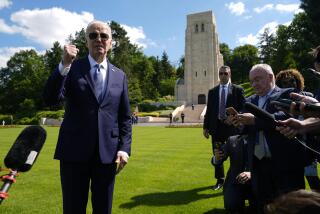White House admits higher-level officials should have gone to Paris
Reporting from Washington â The White House acknowledged Monday that it blundered in not sending a prominent administration official to Sundayâs giant rally in Paris in support of free speech, making a rare admission of a mistake but offering little insight into how it happened.
Spokesman Josh Earnest told reporters that the White House regretted sending only the U.S. ambassador to France and an assistant secretary of State to the march, which drew more than 40 world leaders and about 1.5 million people to show support for victims of last weekâs terrorist attacks in which gunmen opened fire at a newspaper and a kosher market, killing more than a dozen altogether.
âItâs fair to say that we should have sent someone with a higher profile to be there,â Earnest said, adding that the decision should not raise doubts that the administration stands âshoulder-to-shoulder with our allies in France.â
Critics quickly blasted the White House for leaving the U.S. underrepresented at the event, and allies expressed bewilderment at the missed opportunity. A photograph of the world leaders â with arms linked in solidarity â splashed across front pages and TV around the world. Among those present were French President Francois Hollande, German Chancellor Angela Merkel, British Prime Minster David Cameron, Israel Prime Minister Benjamin Netayahu and Palestinian Authority President Mahmoud Abbas.
White House officials would not describe how they decided to essentially sit the event out. The decision was not made by Obama, Earnest said, but the spokesman would not say who made the call.
The president was at the White House all day Sunday, with no public events on his schedule. Earnest declined to comment on how Obama spent his day. Potential surrogates had little explanation. Vice President Joe Biden spent the day at his home in Delaware. Atty. Gen. Eric H. Holder Jr. traveled to Paris to attend a series of meetings with French officials on counter-terrorism in the wake of the attacks, but did not attend the rally.
Secretary of State John F. Kerry, perhaps the mostly likely replacement, had the clearest scheduling conflict. Kerry was in India and due for a surprise trip to Pakistan on Monday.
That left Jane Hartley, the U.S. ambassador to France, and Victoria Nuland, the assistant secretary of State for Europe, as the highest-ranking officials at the march.
Although the White House acknowledged a higher-level official should have attended, it did not necessarily concede the president should have been the one to make the trip.
Earnest suggested security was a factor in the decision, noting that it was a massive, outdoor rally organized in just a couple of days. The presidentâs presence would have changed the nature of the event, he said.
âIâm confident that the professionals at the Secret Service could overcome those challenges, but it would have been very difficult to do so without significantly impacting the ability of common citizens to participate in this march,â he said.
Indeed, presidential trips overseas involve several weeks of planning in coordination with the Secret Service. It is not usual for the president to avoid large, open-air events that are difficult to secure, even within the U.S. Only once recently has Obama traveled on short notice to a major public event overseas: Nelson Mandelaâs funeral. But because Mandelaâs death was long expected, planning for that trip occurred well in advance.
Still, thereâs little sign a presidential or vice presidential trip was ever seriously considered. A Secret Service official said the agency was not consulted about the possibility.
âWe were never asked or notified about a trip to Paris,â said the official, who asked not to be named discussing security matters.
Despite the mea culpa, France rushed to defend the Obama administration. Though Obama was not among the nearly four dozen world leaders who appeared, âthere are absolutely no hard feelings,â Gerard Araud, Franceâs ambassador to the United States, said on MSNBC. âThe first impression we have had is the support expressed by President Obama.â
But Araud noted that Obama visited the French Embassy in Washington to express condolences, and that he put out two written statements last week deploring the massacres and expressing sympathy for France. Obama also briefly talked about the attacks at the beginning of speeches he gave last week on domestic initiatives.
Kerry announced Monday that he was shuffling his schedule to visit France at the end of the week. He insisted that the criticism of the administration was âquibbling,â given officialsâ repeated expressions of support.
Obamaâs decision drew fire from a number of Republicans. But even some critics often sympathetic to the administration said the decision was a blunder.
âNot an excuse in the universeâ could explain the lapse, tweeted Aaron David Miller, a former U.S. peace negotiator who is now with the Wilson Center for International Scholars in Washington.
More to Read
Sign up for Essential California
The most important California stories and recommendations in your inbox every morning.
You may occasionally receive promotional content from the Los Angeles Times.












